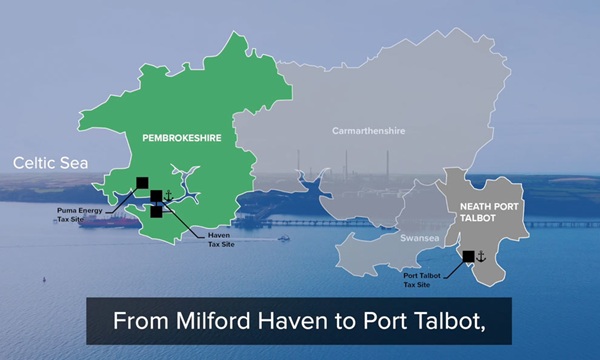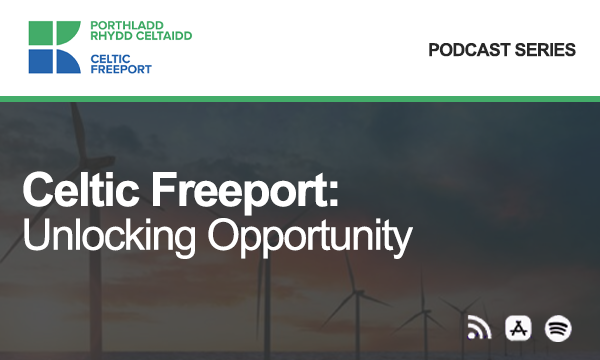
Celtic Freeport has a privileged position at the heart of decarbonisation, energy innovation and industrial renewal. It has the potential to be transformative, not just for South Wales but for the UK. To unlock that potential, we now need to move from plans and strategies to delivery.
We are here to help decarbonise heavy industry and power generation while supporting a just transition. We want to see growth that is both inclusive and sustainable; growth that secures our industrial base and generates opportunity for the communities which have long underpinned it.
That means accelerating the deployment of renewable energy technologies including hydrogen, sustainable fuels, carbon capture and marine energy, with a particular focus on floating offshore wind (FLOW).
FLOW is a huge part of our region’s future. With recent funding and sea bed leasing announcements from The Crown Estate, Port Talbot is now one of the preferred ports for FLOW developers and Pembroke Dock positioned to support. But this is just the starting point. To be competitive, we must now invest in deep-water access, heavy-lift capacity and large laydown areas -– assets that will be critical for turbine assembly, integration, and long-term maintenance.
These investments are significant. Each port alone faces costs in the region of half a billion pounds. But they are essential if we want to become a hub for clean energy infrastructure and capture our share of the supply chain.
Alongside port upgrades, we need action on grid infrastructure. Without urgent reform of grid constraints and investment in hydrogen-ready pipelines, we risk bottlenecks that could hold back progress not just for Wales, but for the wider UK energy transition.
This work is not just about infrastructure. It is about people. Real decarbonisation requires skills – both new and existing. That’s why we’re working with colleges, universities and catapults to align skills provision with industry need. This is not a blank-slate exercise. We’re looking at how to adapt the skills already present in our workforce, particularly in sectors such as LNG, oil and gas and steel, to support emerging industries.
We’re also investing in research and development. Working with the High Value Manufacturing Catapult and the Offshore Renewable Energy Catapult, we’re identifying areas of innovation where Wales can lead, from digital twin technologies and new manufacturing methods to specialist components like anchors, chains and subsea cabling. These developments need to be industry-led, and critically, they need support to move from concept to commercial deployment. The Freeport can play a role in bridging these funding gaps and ensuring that innovation is connected to real industrial need.
None of this happens in isolation. We are working hand in hand with the South Wales Industrial Cluster to create a roadmap that brings together infrastructure, innovation and investment. We’re aligned in our ambition to see South Wales become a low-carbon industrial powerhouse. But we can’t do it alone.
If I had one message to give to government -– both in Cardiff and Westminster -– it would be this: we need action, not just ambition.
First, we must continue to streamline planning and permitting. At the moment, the system is fragmented, with multiple layers of government and agencies creating delays and duplication. This is especially damaging for emerging technologies like hydrogen, FLOW and carbon capture. A more coordinated and efficient approach would unlock investment and reduce uncertainty.
Second, we need urgent attention on grid connectivity. The energy Wales will generate must be able to flow to homes, to industry, to the national system. Reforming grid access must remain an area of continued focus.
Third, we need a clearer and more stable long-term policy framework. Investors need confidence that revenue support mechanisms such as Contracts for Difference or tax incentives will remain in place. Without that certainty, private capital will hesitate, and we cannot afford delay.
And finally, we need to shift from policy documents to practical delivery. The UK is excellent at strategy. Now, we need to match that with excellence in implementation. That means prioritising the infrastructure that matters, speeding up delivery, and working closely with industry to de-risk investment and move faster on projects that will drive the transition forward.
The foundations are in place and the vision is there. The partnerships are forming. But for the Celtic Freeport to deliver on its promise—and for South Wales to play its full role in decarbonising the UK—we need momentum. We need decisions, coordination and action.
If we get this right, we can help build not just a low-carbon future, but a better one.
Luciana Ciubotariu talks about this and more in the Celtic Freeport: Unlocking Opportunity podcast episode How the Celtic Freeport is Powering Regional Decarbonisation. Listen to the podcast here.










